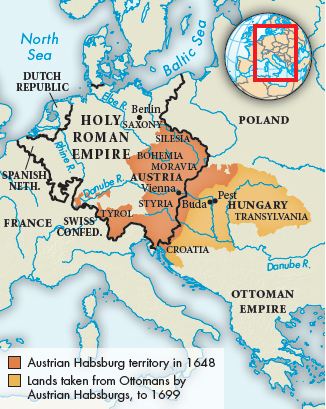The Austrian Habsburgs
Like all of central Europe, the Austrian Habsburgs emerged from the Thirty Years’ War impoverished and exhausted. Their efforts to destroy Protestantism in the German lands and to turn the weak Holy Roman Empire into a real state had failed. Defeat in central Europe encouraged the Austrian Habsburgs to turn away from a quest for imperial dominance and to focus inward and eastward in an attempt to unify their diverse holdings.

Habsburg victory over Bohemia during the Thirty Years’ War was an important step in this direction. Ferdinand II (r. 1619–
With the support of this new nobility, the Habsburgs established direct rule over Bohemia. Under their rule, the condition of the serfs worsened substantially. The Habsburgs also successfully eliminated Protestantism in Bohemia. These changes were important steps in creating absolutist rule.
Ferdinand III (r. 1637–
Despite its reduced strength, the Hungarian nobility effectively thwarted the full development of Habsburg absolutism. Throughout the seventeenth century Hungarian nobles periodically rose in revolt against the Habsburgs. In 1703, with the Habsburgs bogged down in the War of the Spanish Succession, the Hungarians rose in one last patriotic rebellion under Prince Francis Rákóczy (RAH-
Elsewhere, the Habsburgs made significant achievements in state-